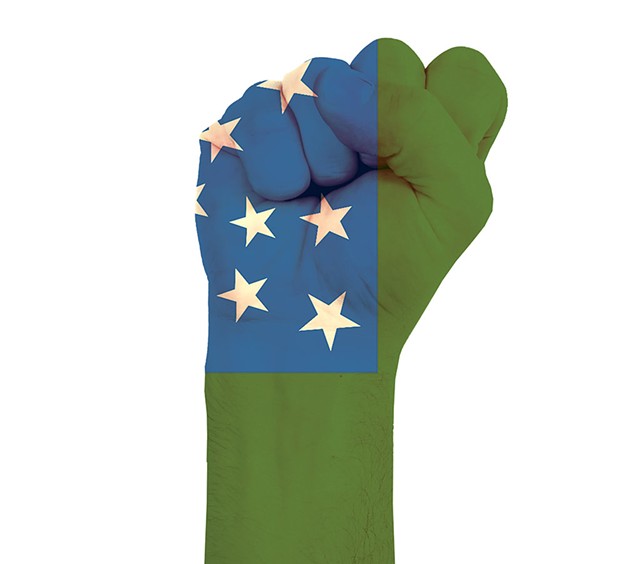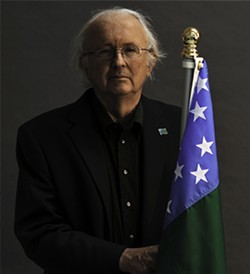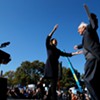click to enlarge 
A new poll found that nearly 21 percent of Vermonters think the state should consider “peaceably leaving the United States and becoming an independent republic, as it was from 1777 to 1791.”
That’s a jump from 11.8 percent of respondents who agreed with a similar proposal in a 2007 poll.*
The increase in secessionist sentiment — measured in surveys conducted by the University of Vermont’s Center for Rural Studies — could reflect a Trump bump.
“Given the aggressive and destructive behavior of the United States of Empire this past decade, it is not surprising that more and more forward-thinking Vermonters support independence and a Second Vermont Republic,” Rob Williams,
the leader of a Verexit campaign, said in a prepared statement.
Asked in a phone interview Monday about the impact of the 2016 election, Williams said, “The grotesque nature of the Trump presidency has helped crystallize things for Vermonters.”
In a separate poll question, about 58 percent of the 611 respondents said “no” when asked, “Is the federal government adequately serving the needs and concerns of Vermonters?”
The results of the UVM survey, conducted in February, “gives us much more energy to keep pressing what we’ve been doing since 2004,” said Williams, the leader of secession group Second Vermont Republic, or 2VR.
Williams and his associates seek to link their efforts to the sovereign status Vermont enjoyed after declaring its departure from the British Empire in 1777 and before it joined the U.S. as the 14th state in 1791.
The contemporary push for secession first gained ground a decade ago due in part to deepening opposition to then-president George W. Bush. The campaign’s presence all but evaporated following the 2008 election of Barack Obama — and after a controversy that erupted the same year involving the Vermont movement’s flirtation with a pro-secession group known as the League of the South.
click to enlarge 
The decision to establish ties with the League of the South was initiated by retired Duke University economics professor Thomas Naylor, the prime mover behind the Second Vermont Republic. But the Southern Poverty Law Center, which monitors hate groups, referred to the League of the South at the time as “racist neo-Confederates,” causing considerable political damage in Vermont even as Naylor denied any racist motivation for the collaboration with the group.
Naylor died in 2012, leaving Williams to fill the leadership void in the Vermont secession cause. He rebranded the group 2VR to distinguish it from the Naylor-era movement, which had used the acronym SVR.
Williams, a Waistfield resident and lecturer in UVM’s environmental studies program, said 2VR intends to focus in the coming months on advocating the creation of a state bank. Proponents of secession see efforts to make Vermont more financially self-sufficient as an essential precondition to transforming the state into a nation.
2VR paid UVM’s Center for Rural Studies a total of $1,000 to incorporate into this year’s “Vermonter” poll the questions pertaining to secession and attitudes toward Washington.
The poll has a margin of error of plus or minus 4 percent.
*Correction, April 25, 2017: A previous version of this story included incorrect
poll results.


















































